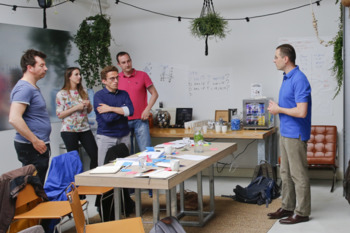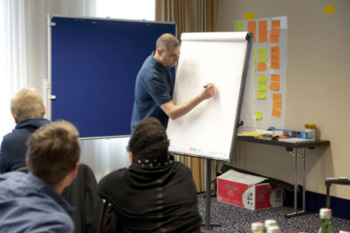Mary Poppendieck talked today at Agile 2008 about compensation schemes, attacking the traditional model of bonuses and appraisals. Pointing out that a traditional bonus system undermines teamwork and implies that most people will not do their best without additional financial incentives, she suggested focusing on more immediate and non-financial motivation techniques.
Quoting Jeffrey Pfeiffer’s testimony to US Congress in 2007, Mary Poppendieck said that there is a lot of evidence that intrinsic motivation is much more effective than external factors such as financial bonuses, pointing out that external motivators can actually undermine intrinsic factors. Opensource projects, for example, work because people care about them and starting to pay some of the contributors will negatively affect the motivation of other contributors on the project.
Citing a research by Arie de Geus, author of The living company, Mary said that highly successful companies foster a culture which does not use financial compensation as a primary rewards motivator. The same research shows that those companies pay people above market rates to to reduce turnover and attract the best people, coupled with rewards that share organizational success, but money is not the primary reason why people work there. As an extreme case, Mary mentioned Tandem Computers, who according to her gave no salary information on job interviews. Their CEO was of the opinion that people who come for money will leave for money and did not want those people onboard.
Team payment does not work
Mary said that 80% compensation systems reward individual, not team performance and that only 10-20% of appraisal systems include team performance, causing a lot of competition inside teams that discourage team behaviour. In software development, it is very hard to establish the effects of individual contributions and good teamwork is key to the project. Most individual compensation schemes, according to the presentation, absorb vast amounts of management time and resources and leave nobody happy, but team compensation strategies are not easy to implement. Mary presented results from HP’s experiments during the beginning of the nineties, when HP allowed 13 local organisations to experiment with team-incentive plans. All programs were discontinued by the 4th year, due to constant changes to the plans which were needed to distribute available money among the teams and a wide dissatisfaction with the plans by employees. On the end, all projects concluded with no relationship or negative relationship between actual incentives and performance. San Diego team pay for performance program started great, with everybody feeling very positive about the plan in the first six months and most teams outperforming their goals. However, that meant that a lot more money was given out than HP planned for, so the standards were adjusted in the next six months which met stiff resistance. High performance teams started excluding new members, managers felt that teams concentrated on money not jobs and the plan was discontinued because it caused way too much hassle.
Mary also gave a case study of a high performing team that was given a large bonus to distribute internally. Everyone agreed that individuals should get a part matching their contributions, bot no one could agree on individual contribution levels. After a heated discussion, team decided on an equal split which left everybody unhappy, and the same group of people never worked again well as a team.
Instead of financial incentives, companies should focus more on encouraging and training teams to provide internal intrinsic positive feedback and non-financial positive reinforcements, according to Mary.
Fair compensations are effective
Citing a research from Elliot Jacques, she said that the most effective financial compensation schemes are those that are felt fair in the organisation. Differences in salaries can exist between different levels that are perceived fair. In software, criteria that is generally accepted fair are the timespan of discretion (how long can you work without your boss looking over your shoulder) and job complexity. That kind of compensation schemes is, according to Mary, validated by many studies over several decades. An especially important idea was that the money should not be used a differentiator at the same level, and that if money moves rapidly in the market, everyone in the company should be moved up regularly, not generating a gap between new hires and older employees.
On the end, Mary gave some advice on effective incentives and compensation schemes:
- abandon the zero-sum game: eliminate competition for a bonus pool
- tell people directly what's important and why. It is cheaper and easier than financial incentive systems signaling what is important
- base pay differentials on job complexity, avoid individual performance bonuses because they extinguish collaboration
- base collective rewards on broad measures — the larger the group that is measured, the more reliably performance can be accessed. Use profit sharing schemes instead of bonuses to tie people to the organisation goals.
- keep in mind the norm of reciprocity — if people feel that they are being treated generously, they will reciprocate it with increased discretionary effort.


